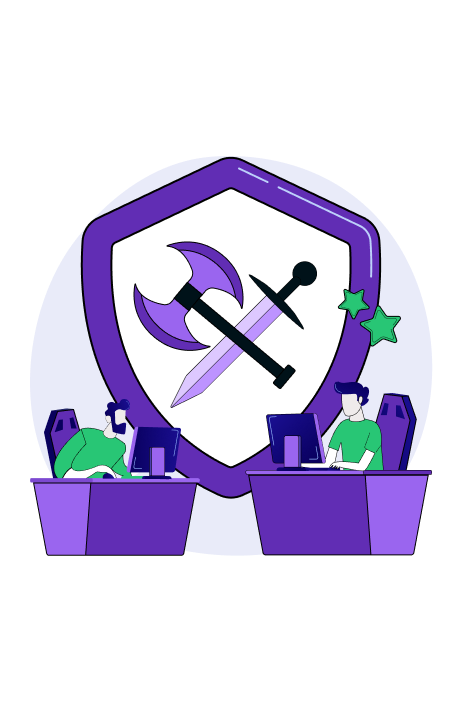
Building a digital defense against harassment and trolling
Bad behavior, bullying, abuse, and harassment have always been prevalent in society and with more than half of the world’s population having some sort of a digital footprint, online harassment and trolling have become even more pervasive. Research conducted by Cyberbullying Research Center shows that since the start of the Covid-19 Pandemic, online bullying has increased by up to 40%. For content creators, this is incredibly intimidating since their online presence is a crucial part of their lives.
With the fast-growing technological advances made every day and cyberbullying taking many new shapes and forms, it has become essential that content creators adopt the technological skills that will protect them. However, we can provide you with guidelines to create digital defenses that will make your online journey toward success safe.
How content creators can protect themselves
Incidences of severe online bullying cases are becoming increasingly common. Even though institutions and experts consider this a serious mental health concern, there is still work to be done in terms of creating public awareness and helping those who are affected by it.
The different faces of harassment and trolling
In 2017, the Pew Research Center conducted a study that showed that at least 41% of Americans have experienced online harassment and bullying in some form or other. For content creators, having a positive and healthy online presence requires maintaining a positive image amongst their audience. Therefore, online bullies often use malicious behavior such as masquerading, dissing, flaming, trolling, cyberstalking, doxing, and fraping.
As encounters have become more common and severe over the years, we find that they range from less severe forms such as name-calling and purposeful embarrassment to more severe forms like that which include physical threats, stalking, sustained harassment, and even sexual harassment.
Keeping what’s personal… personal
Even for new content creators, fan bases can grow fast, making them vulnerable as they are more exposed. Boundaries are important and should be kept firm by protecting personal information that is not meant to be shared with viewers. Make sure you have thoroughly checked the privacy settings of any app, website, channel, or social media profile. Some require access to your location: avoid it. Any contact information that does need to be shared, should be apart from your private residence and contact numbers.
Ensure all your profiles are protected with at least two-step authentication. It may take a few additional seconds of your day but best be safe than sorry. Make your passwords, passcodes, or authentication questions as strong and as unique as possible.
Avoid sharing videos or photos that reveal your personal address or information that exposes you ]to stalkers. Avoid sharing specifics of your daily routine: places you visit, the time you visit, regular shopping spots, restaurants, or cafes. Take special care to avoid exposing your personal social media profiles (which should be kept entirely apart) to your content-creating profiles.
Building digital walls
One of the best ways to curtail online harassment is to learn to turn a blind eye. However, that may not always work. Familiarize yourself with the privacy policies and security settings of all of your profiles. Avoid using public wifis and hotspots as they put your location and data at risk.
Many apps allow you to filter comments. Make sure to include hateful, racist, or gender-biased terminology in your filter list. When the situation seems to escalate with certain users, block them without thinking twice. You can even go as far as to turn off commenting for specific types of content. Although this is often frowned upon, it is often best that commenting on sensitive or opinionated subjects is restricted.
Emotional well-being
Exposure on the internet can be a double-edged sword for content creators. While it can bring in more attention and opportunities, it can also leave them vulnerable to malicious individuals who may use their personal information or creative work without permission. This can lead to emotional and psychological harm, causing stress and anxiety that can hinder their ability to maintain a healthy mindset and continue creating quality content. In extreme cases, it can even lead to burnout and the end of their online presence altogether. It’s important for content creators to take steps to protect themselves and their work to prevent these negative consequences and ensure they can continue pursuing their passion with confidence. Restrict yourself to a certain amount of hours each day allowing you to maintain balance in your daily routine. Learn to differentiate when it is best to ignore, or when action is required. Be prepared for all sorts of maliciousness ahead of time and establish how you will respond to them.
Know when to ask for help
The success of content creators is contingent upon the use of technology, thus it is essential that they know the importance of building digital defenses to keep their online reputation positive and protect themselves from harassment and trolling. The advancement of technology has opened up opportunities for content creators to be able to share their creativity and talent and have a global outreach at the tips of our fingers, quite literally so. However, while communicating with people has become increasingly simple, implementing tips and strategies to safeguard their identity, content, reputation and their mental well-being is vital.
Conclusion
If you ever feel you are in way over your head, know that there are others out there just like you and places and people you can reach out to for help. It can be someone you are close to and trust completely or an institution that provides support for such situations. Once you have accepted you need help, take the necessary steps to heal and protect yourself. That could start with self-therapy or seeking professional help.